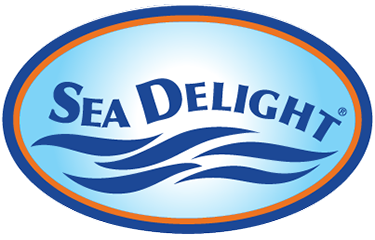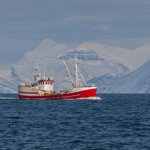The Top 25: Sea Delight Q&A

Sea Delight is featured in The Top 25: Sustainability & Conservation list, published by SeafoodSource on 24 September, 2020.
SeafoodSource: What kind of trends have informed Sea Delight’s sustainability/conservation efforts?
Sea Delight: We listen to our customers. We strive to not only give them what they want in responsibly sourced seafood but to try to anticipate their requirements in the future.
In sourcing seafood, the trend for major buyers has definitely been towards offering wild caught or aquaculture raised seafood that is certified sustainable by a certification body that has met the benchmark standards of and been recognized by the Global Sustainable Seafood Initiative (GSSI). These include sustainability certification programs such as the Marine Eco Label Japan (MEL), Marine Stewardship Council (MSC), Best Aquaculture Practices Certification (BAP), and the Aquaculture Stewardship Council (ASC). In the case of wild fisheries on the path to sustainable certification, our customers require seafood sourced from comprehensive fishery improvement projects (FIPs) that are making measurable progress towards certification and are sharing that progress with the public in a transparent manner.
It is worth noting that Sea Delight is a member of GSSI and participated in the Executive Working Group for Fisheries in the development of its sustainability benchmarking standard.
We are also members of the Global Dialogue on Seafood Traceability (GDST). We understand that traceability is a key component of managing responsible fisheries. Sea Delight has supported GDST and been involved in the working groups engaged in the development of the GDST Interoperable Seafood Traceability System since the GDST started its program.
The other growing trend is a requirement for seafood that is sourced from chains of custody that respect fair labor practices and social responsibility. To this end, we require the processors we source from to be SEDEX/SMETA, AMFORI, BSCI, SA8000 or equivalent inspected and approved for labor and social responsibility standards.
For the same issues onboard fishing vessels, we require all suppliers to submit annual reports on labor and social responsibility conditions in the fisheries they source from. We join many in the seafood industry in hoping that there will soon be a recognized benchmarked standard for fisheries and aquaculture that is fair, credible, and scaled to include all fisheries/farms, even those small-scale operations from developing nations.
Because we are committed to this goal, we have also participated in the GSSI SSCI working group in the development of a seafood-specific benchmarking tool. The “At-Sea Operations Social Benchmarking Criteria” has been completed and the public comment period ended on 31 August. We hope this new benchmarking criteria will lead to a reliable choice of inspection and verification bodies to certify labor and social responsibility standards for fisheries and aquaculture operations in the near future.
The third trend, for many of our customers, is what to do about the plastic used in the seafood industry. We need realistic solutions on how to reduce use, increase re-use, and increase recycling of the plastic used, while reducing the environmental impact of the plastic that is discarded.
Sea Delight is conducting research into alternatives, such as replacing plastic outer retail packs of frozen seafood with paper. We are also working with a Malaysia-based plastic resin producer and one of our vacuum bag manufacturers in Vietnam to create and test vacuum bags for frozen seafood that will be bio and landfill compostable, composed partly of recycled plastic and be recyclable. In both cases we understand the solutions must be viable and competitive in terms of production costs. We hope to have actual sample bags ready for testing and shelf-life evaluation in the near future.
SeafoodSource: What key features serve to set Sea Delight’s sustainable seafood offerings apart in the market?
Sea Delight: The key feature is trust. Our customers trust Sea Delight to provide responsibly sourced seafood and to share the story of that product with them. They know we bring a real “hands-on” passion for sustainability and support for fishing communities to the table. We work directly with major conservation NGOs and our suppliers and fishers/farmers worldwide to make real progress towards sustainability goals. We also support our customers with detailed timely response to any questions they may have about the products they buy or are considering purchasing.
Sea Delight has earned a reputation as an industry leader in responsibly sourced seafood through long experience. We began this journey in 2012 by launching four sustainability projects.
In mid-2012, we joined with a major Indonesian NGO in leading a demersal handline fishery FIP in Central Sulawesi and a handline tuna FIP in East Java. This FIPs helped pioneer the use of Android app data collection systems, real engagement with local fisheries authorities and the use of GPS to track and map fisheries. We continue to support demersal fishery and handline tuna fishery FIPs in Indonesia to this day.
In Vietnam, we signed an MOU with a major conservation NGO and started two “pre-FIP” projects called “Better Fishery Practice Initiatives” (BFPI). One, in the Vietnam tuna fishery, promoted the use and awareness of circle hooks in the fishery and collected data on their use. Many vessels tried the C-hooks and changed from using J-hooks to C-hooks. C-hooks have been proven to reduce marine turtle interactions. This work continues in the current successful Vietnam Handline Tuna FIP and the Vietnam Handline Swordfish FIP. Sea Delight is an active participant in both FIPs.
The other Vietnam BFPI worked with a high seas demersal handline fishery based in La Gi, Binh Thuan Province. This project trained fishermen to act as volunteer observers in their fishery and to collect important catch composition data. This early work taught us important lessons that we apply to the sustainability work we are engaged in today.
We also strongly support leading conservation NGOs in their work to influence the decisions of regional fisheries management organizations (RFMOs). We sign industry letters to RFMOs in support of sustainable policies like harvest control rules with target and limit reference points for tuna stocks. In 2018, we sent a representative to the WCPFC annual meeting to appeal for the issuance of a new harvest strategy for northern swordfish and for more recognition of the importance of secondary catch species like mahi mahi.
SeafoodSource: How does sustainability factor into your overall mission and strategy as a business?
Our official sustainability policy [is as follows]:
- Sea Delight is committed to ensuring seafood remains a secure resource for future generations to enjoy.
- We use our buying power and position in the seafood industry to employ and promote responsible practices globally. Our own principles, including strategic sourcing and research, leverage positive change in our suppliers and customers.
- Our informed choices are strengthened by establishing transparency in our supply chains and collecting data so we can eliminate illegal, unreported, and unregulated (IUU) seafood from our supply. We are active participants in the US NOAA SIMP mandatory anti-IUU traceability program. We educate our employees, suppliers, and customers by sharing supply chain and traceability information to tell the story of the products we offer and to help create a more conscious industry.
- We extend our commitment beyond our own practices and across commercial, governmental, and civil sectors. We engage in advocacy, education, and direct investment through the funding of and participation in fishery improvement projects (FIPs). These FIPs improve the environmental, economic, and social aspects of fisheries and communities across the world. Our sustainable seafood policy is the foundation for Sea Delight’s future business and is intended to inspire positive change throughout the seafood industry.”
SeafoodSource: How does Sea Delight approach sustainable, responsible development?
Sea Delight: Again, as members of GSSI, we have been helping with the development of the “Measuring and Accelerating Performance of Global Seafood Supply” or “Seafood MAP” project. This project aims to fill the gap for fisheries and farms, especially those in developing states, that need to take the first steps towards sustainable development and management but may not be ready for or in need of a formal FIP or AIP.
To quote from the GSSI MAP website: “Seafood MAP supports non-certified seafood producers, including small-scale fishing and farming communities, to become more sustainable; and helps markets to supply more sustainable seafood. The program is developing a joint roadmap and common language based on the U.N. Sustainable Development Goals and FAO Guidelines, while supporting local priorities. By doing so Seafood MAP will unlock the potential of both producers and investors to help non-certified fisheries and aquaculture meet the growing global demand for seafood, sustainably.”
We also support many FIPs in small or medium scale fisheries in developing nations that are critical for the sustainable development of the fishing communities that rely on them. We are also active members of the Indonesian Pole & Line and Handline Fisheries Association (AP2HI) and the International Pole and Line Foundation (IPNLF). These conservation NGOs are dedicated to the sustainable development handline and pole and line tuna fisheries worldwide.







Share